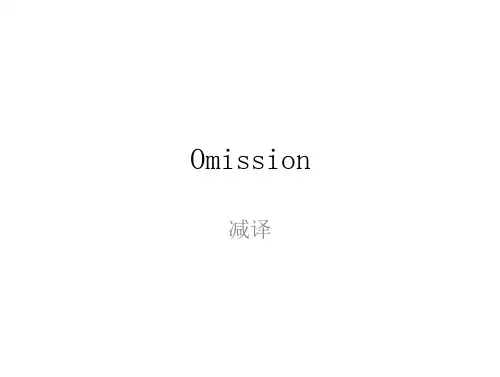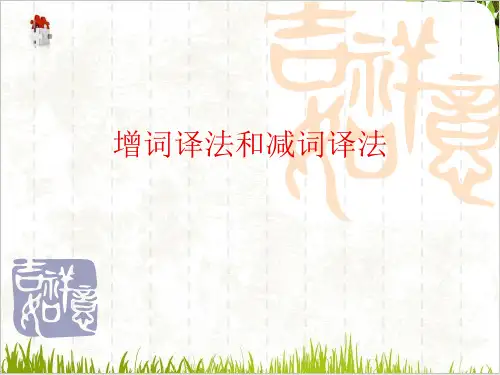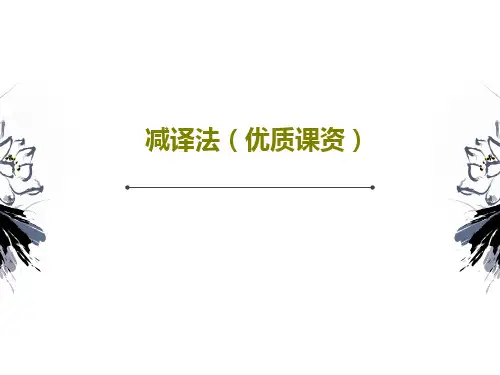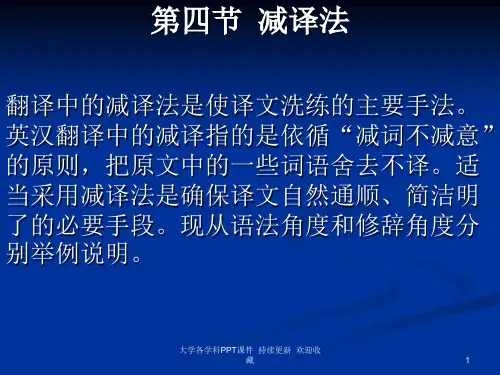翻译课件7 减译法
- 格式:ppt
- 大小:579.50 KB
- 文档页数:25
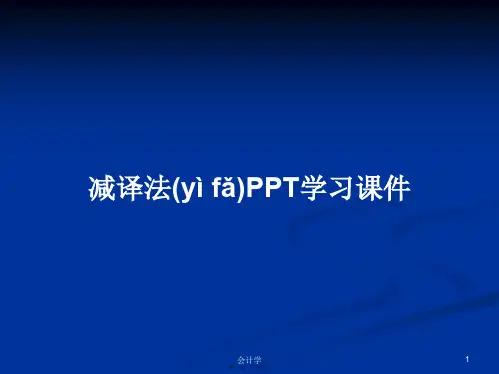
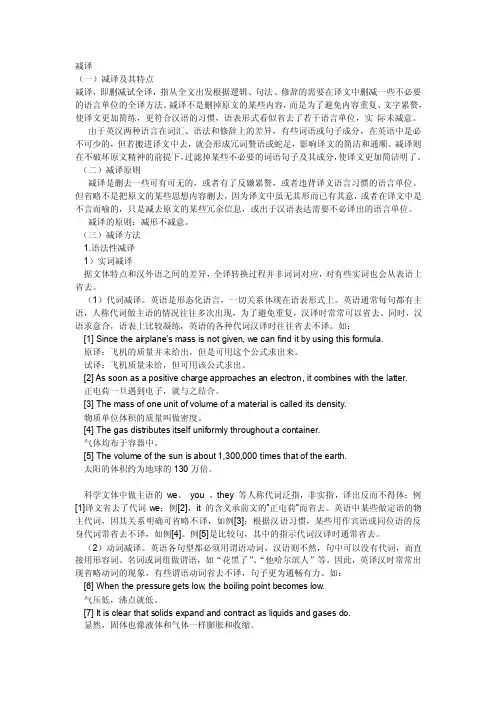
减译(一)减译及其特点减译,即删减试全译,指从全文出发根据逻辑、句法、修辞的需要在译文中删减一些不必要的语言单位的全译方法。
减译不是删掉原文的某些内容,而是为了避免内容重复、文字累赘,使译文更加简练,更符合汉语的习惯,语表形式看似省去了若干语言单位,实际未减意。
由于英汉两种语言在词汇、语法和修辞上的差异,有些词语或句子成分,在英语中是必不可少的,但若搬进译文中去,就会形成冗词赘语或蛇足,影响译文的简洁和通顺。
减译则在不破坏原文精神的前提下,过滤掉某些不必要的词语句子及其成分,使译文更加简洁明了。
(二)减译原则减译是删去一些可有可无的,或者有了反嫌累赘,或者违背译文语言习惯的语言单位。
但省略不是把原文的某些思想内容删去,因为译文中虽无其形而已有其意,或者在译文中是不言而喻的,只是减去原文的某些冗余信息,或出于汉语表达需要不必译出的语言单位。
减译的原则:减形不减意。
(三)减译方法1.语法性减译1)实词减译据文体特点和汉外语之间的差异,全译转换过程并非词词对应,对有些实词也会从表语上省去。
(1)代词减译。
英语是形态化语言,一切关系体现在语表形式上。
英语通常每句都有主语,人称代词做主语的情况往往多次出现,为了避免重复,汉译时常常可以省去。
同时,汉语求意合,语表上比较凝练,英语的各种代词汉译时往往省去不译。
如:[1] Since the airplane’s mass is not given, we can find it by using this formula.原译:飞机的质量并未给出,但是可用这个公式求出来。
试译:飞机质量未给,但可用该公式求出。
[2] As soon as a positive charge approaches an electron, it combines with the latter.正电荷一旦遇到电子,就与之结合。
[3] The mass of one unit of volume of a material is called its density.物质单位体积的质量叫做密度。
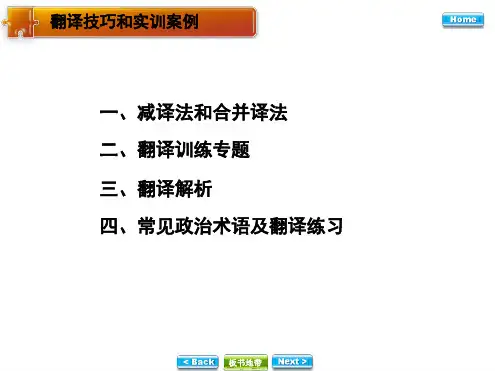
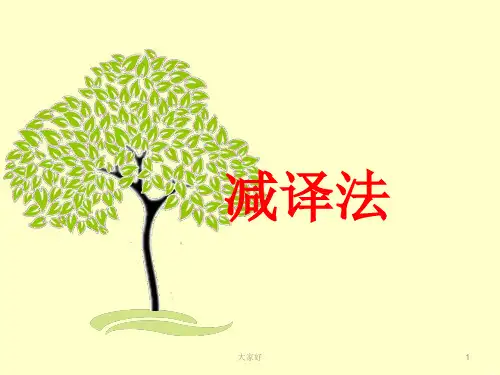
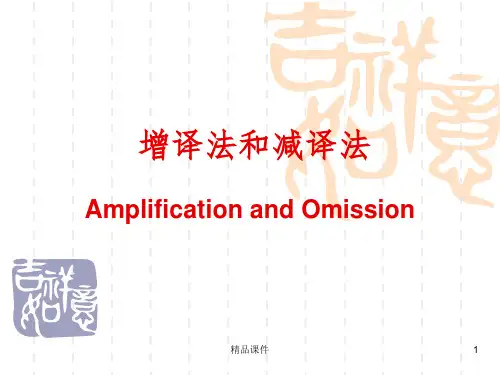
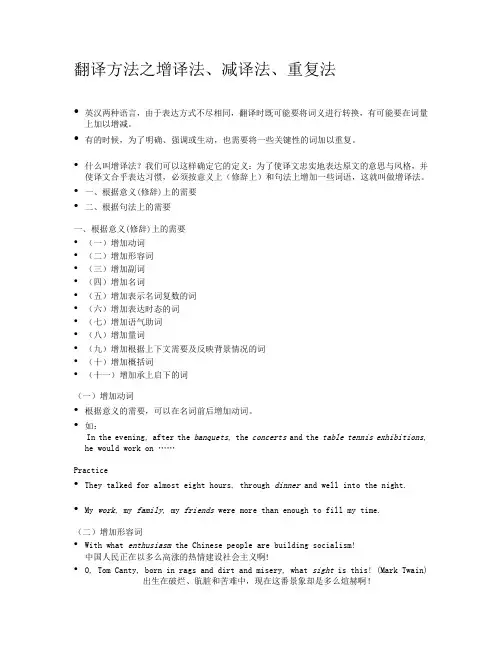
翻译方法之增译法、减译法、重复法•英汉两种语言,由于表达方式不尽相同,翻译时既可能要将词义进行转换,有可能要在词量上加以增减。
•有的时候,为了明确、强调或生动,也需要将一些关键性的词加以重复。
•什么叫增译法?我们可以这样确定它的定义:为了使译文忠实地表达原文的意思与风格,并使译文合乎表达习惯,必须按意义上(修辞上)和句法上增加一些词语,这就叫做增译法。
•一、根据意义(修辞)上的需要•二、根据句法上的需要一、根据意义(修辞)上的需要•(一)增加动词•(二)增加形容词•(三)增加副词•(四)增加名词•(五)增加表示名词复数的词•(六)增加表达时态的词•(七)增加语气助词•(八)增加量词•(九)增加根据上下文需要及反映背景情况的词•(十)增加概括词•(十一)增加承上启下的词(一)增加动词•根据意义的需要,可以在名词前后增加动词。
•如:In the evening, after the banquets, the concerts and the table tennis exhibitions, he would work on ……Practice•They talked for almost eight hours, through dinner and well into the night. •My work, my family, my friends were more than enough to fill my time.(二)增加形容词•With what enthusiasm the Chinese people are building socialism!中国人民正在以多么高涨的热情建设社会主义啊!•O, Tom Canty, born in rags and dirt and misery, what sight is this! (Mark Twain) 出生在破烂、肮脏和苦难中,现在这番景象却是多么煊赫啊!Practice•With the meeting to begin in hours, I hadn’t have time to worry about such trifles.我没有闲功夫为这些琐事操心。

